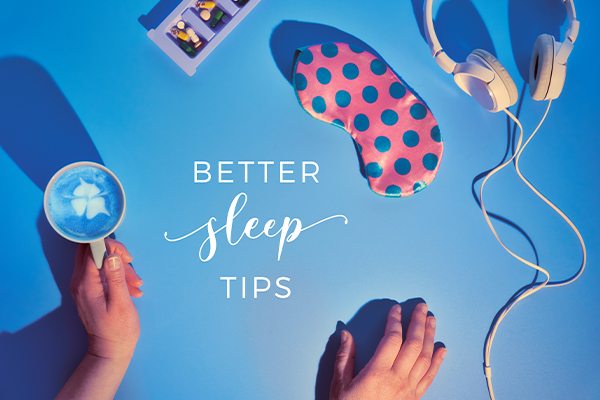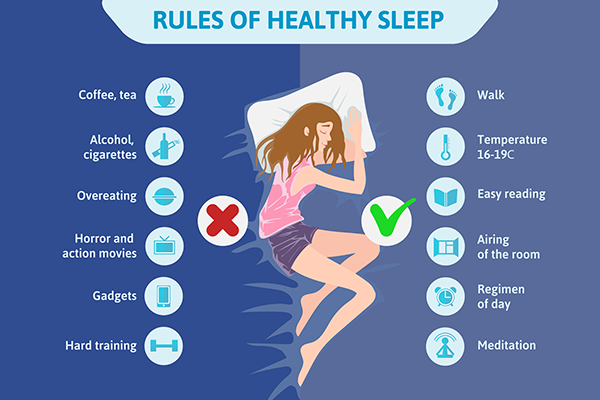
Sleep is more than just a nightly ritual—it’s a cornerstone of overall health and well-being. If you’ve been searching for tips for better sleep or wondering how to sleep well, you’ve come to the right place. In this comprehensive guide, we’ll cover good sleep tips, healthy sleep habits, and best sleep advice that are scientifically proven to help you improve sleep quality, boost your energy levels, and enhance your overall quality of life.
Synopsis
- Understanding the Importance of Quality Sleep
- Establish a Consistent Sleep Schedule: How to Sleep Well Every Night
- Create a Sleep-Friendly Environment: Best Ways to Sleep in a Relaxing Setting
- Mind Your Diet: Sleep-Friendly Foods for Better Sleep Quality
- Incorporate Regular Exercise: Healthy Sleep Habits That Work
- Unwind with Relaxation Techniques: The Best Sleep Advice for Stress Relief
- Manage Technology Use at Night: Minimizing Blue Light for Better Sleep
- Maintain Good Sleep Hygiene: A Comprehensive Look at Best Sleep Tips
- Conclusion
- A Note on Comprehensive Healthcare
Understanding the Importance of Quality Sleep
Quality sleep is essential for maintaining optimal cognitive, emotional, and physical health. Recent research indicates that adults need 7-9 hours of sleep each night. According to the Centers for Disease Control and Prevention (CDC), about 35% of adults suffer from sleep deprivation, which can lead to an increased risk of heart disease, obesity, depression, and other chronic conditions.
Sleep is crucial because it:
-
Enhances Cognitive Function: Proper sleep helps in memory consolidation, learning, and decision-making.
-
Regulates Emotions: A good night’s sleep can lower stress levels, reduce anxiety, and improve your mood.
-
Boosts Physical Health: Sleep plays a vital role in tissue repair, hormone regulation, and immune function.
By understanding these benefits, you’re better prepared to adopt healthy sleep habits and implement the best ways to sleep that will leave you feeling refreshed every day.

Establish a Consistent Sleep Schedule: How to Sleep Well Every Night
One of the best sleep tips for anyone seeking how to sleep well is to maintain a consistent sleep schedule. This means going to bed and waking up at the same time every day—even on weekends.
Why It Works:
-
Regulates Your Circadian Rhythm: Your body’s internal clock thrives on routine. When you stick to a schedule, your circadian rhythm becomes more stable, making it easier to fall asleep and wake up naturally.
-
Improves Sleep Quality: Consistency helps in reducing insomnia and other sleep disorders. Studies have shown that people who follow regular sleep routines are more likely to improve sleep quality.
Real-Life Example:
Jane, a marketing executive, struggled with fatigue due to irregular sleep patterns. By committing to a regular sleep schedule, she experienced a 30% improvement in her energy levels and productivity. Her story is one of many examples proving that healthy sleep habits lead to long-term benefits.
Actionable Tip:
Set an alarm for both wake-up and bedtime. Gradually adjust your schedule if needed and create a wind-down ritual before sleep. These simple yet good sleep tips can make a huge difference.

Create a Sleep-Friendly Environment: Best Ways to Sleep in a Relaxing Setting
Your bedroom environment significantly influences how well you sleep. To follow the best ways to sleep, optimize your space to support relaxation and rest.
Key Elements:
-
Lighting: Use blackout curtains or an eye mask to eliminate disruptive light. A dark room encourages melatonin production, essential for sleep.
-
Noise: Consider earplugs or a white noise machine if ambient noise is an issue. Silence is a key component of good sleep tips.
-
Temperature: Keep your room cool (around 65°F or 18°C). A lower temperature signals your body that it’s time to sleep.
Scientific Insight:
Exposure to artificial light, especially from screens, can suppress melatonin. Studies indicate that a properly darkened room helps maintain your natural sleep-wake cycle, making it one of the best sleep tips for improving sleep quality.
Actionable Tip:
Invest in quality blackout curtains and a white noise machine to create a serene sleep environment. This is one of the simplest yet most effective tips for better sleep.
Mind Your Diet: Sleep-Friendly Foods for Better Sleep Quality
What you eat plays a crucial role in your sleep patterns. Adopting a diet rich in sleep-friendly foods is one of the best sleep tips to improve sleep quality and help you figure out how to sleep well.
Foods That Help:
-
Complex Carbohydrates: Whole grains and sweet potatoes increase serotonin levels, fostering relaxation.
-
Lean Proteins: Turkey, chicken, and tofu contain tryptophan, which aids in melatonin production.
-
Herbal Teas: Chamomile and valerian root teas are celebrated for their calming effects.
Foods to Avoid:
-
Caffeine & Nicotine: These stimulants can interfere with your ability to fall asleep.
-
Heavy or Spicy Meals: Eating these before bedtime may cause discomfort or indigestion.
-
Alcohol: Although it may make you drowsy initially, alcohol disrupts the sleep cycle later in the night.
Real-Life Example:
Mark, a software engineer, noticed a remarkable improvement in his sleep quality by incorporating sleep-friendly foods and eliminating caffeine after 3 PM. His experience shows how simple dietary adjustments can serve as good sleep tips for a more restorative night.
Actionable Tip:
Maintain a food diary to monitor the impact of your diet on sleep. Experiment with incorporating more complex carbohydrates and lean proteins into your dinner, and observe how these tips for better sleep work for you.
Incorporate Regular Exercise: Healthy Sleep Habits That Work
Regular exercise is among the best ways to sleep well. It not only enhances physical health but also plays a critical role in establishing healthy sleep habits.
How It Helps:
-
Increases Sleep Pressure: Exercise boosts the production of adenosine, a neurotransmitter that promotes sleep.
-
Reduces Stress: Physical activity decreases anxiety and improves mood, leading to a more relaxed state before bedtime.
Scientific Explanation:
Moderate exercise during the day increases the body’s need for sleep, making it easier to fall asleep at night. However, avoid vigorous workouts close to bedtime as they might have a stimulating effect.
Real-Life Example:
Linda, a 45-year-old teacher, adopted a daily routine of walking and yoga. Within a month, she reported falling asleep faster and experiencing deeper, more restorative sleep. Her story exemplifies how exercise is one of the best sleep tips for improving sleep quality.
Actionable Tip:
Aim for at least 30 minutes of moderate exercise most days of the week. For an evening routine, opt for light stretching or yoga to maintain your rhythm without overstimulation.
Unwind with Relaxation Techniques: The Best Sleep Advice for Stress Relief
Relaxation techniques are key good sleep tips for those who struggle to wind down at night. Practices such as meditation, deep breathing, and progressive muscle relaxation signal your body that it’s time to sleep.
Benefits:
-
Lowers Cortisol: These techniques help reduce cortisol levels, your body’s primary stress hormone.
-
Activates the Parasympathetic Nervous System: This promotes relaxation and readies the body for sleep.
Scientific Insight:
Mindfulness and meditation have been shown to significantly reduce stress and anxiety, leading to improved sleep patterns. These practices are part of the best sleep advice for anyone looking to understand how to sleep well.
Real-Life Example:
Alex, a busy entrepreneur, integrated a nightly meditation routine into his schedule. He saw a 25% improvement in his sleep quality and experienced less stress during the day. This demonstrates that incorporating relaxation techniques can be one of the best sleep tips available.
Actionable Tip:
Dedicate 20-30 minutes before bed for a calming activity like meditation, reading, or gentle yoga. Experiment with different techniques until you find the perfect method that works for you.
Manage Technology Use at Night: Minimizing Blue Light for Better Sleep
In today’s digital age, managing screen time is critical for those searching for tips for better sleep. Exposure to blue light from electronic devices can interfere with your circadian rhythm and delay the onset of sleep.
The Science Behind It:
-
Blue Light and Melatonin: Electronic devices emit blue light, which suppresses the production of melatonin—the hormone responsible for sleep regulation.
-
Disrupted Sleep Patterns: Continued exposure to screens can delay your natural sleep cycle, making it one of the most common obstacles to how to sleep well.
Actionable Tip:
-
Establish a Digital Curfew: Turn off all screens at least one hour before bedtime.
-
Use Blue Light Filters: Enable “night mode” on your devices to reduce blue light exposure.
-
Keep Devices Out of the Bedroom: This creates a technology-free zone that promotes healthy sleep habits.
Maintain Good Sleep Hygiene: A Comprehensive Look at Best Sleep Tips
Below is a table summarizing key aspects of maintaining good sleep hygiene along with their descriptions and actionable tips:
|
Sleep Hygiene Aspect |
Description |
Actionable Tip |
|
Consistent Routine |
Establish a regular pre-sleep ritual to signal your body that it’s time to wind down. |
Set a fixed bedtime and wake-up time every day, even on weekends. |
|
Comfortable Bedding |
Invest in a quality mattress and pillows to ensure proper body support. |
Upgrade your bedding and choose items that suit your comfort preferences. |
|
Clean & Organized Space |
A clutter-free, tidy environment reduces mental distractions and promotes relaxation. |
Regularly clean and declutter your bedroom to create a calming sleep space. |
This table highlights essential practices that form the foundation of good sleep hygiene. Incorporating these good sleep tips can lead to lasting improvements in your sleep quality and overall well-being.
Conclusion
Improving sleep quality is a multifaceted process that requires a combination of lifestyle adjustments, environmental changes, and mindfulness practices. Whether you’re looking for tips for better sleep, healthy sleep habits, or best sleep advice, the strategies outlined in this guide can help you unlock the secrets to a truly restorative night’s sleep.
A Note on Comprehensive Healthcare
If you are experiencing sleep problems alongside other health concerns, consider seeking specialized care. The Nephrology Department at Manipal Hospitals in Patiala is dedicated to providing comprehensive care for kidney health, which can have a significant impact on your overall quality of life—including your sleep patterns.
At Manipal Hospitals, our expert nephrologists use state-of-the-art technology and personalized treatment plans to manage and treat kidney disorders. We understand that kidney health is closely intertwined with other aspects of your well-being, including sleep quality, energy levels, and overall vitality.
FAQ's
The best way to fall asleep quickly is to develop a consistent pre-sleep routine that includes relaxation techniques such as deep breathing, meditation, or gentle stretching. Combine these good sleep tips with a dark, cool, and quiet sleep environment to effectively improve sleep quality.
Your diet significantly influences your sleep. Consuming foods rich in tryptophan and complex carbohydrates can enhance the production of sleep-inducing hormones like serotonin and melatonin. On the other hand, heavy meals, caffeine, and alcohol before bedtime can disrupt your sleep cycle, making it one of the most important areas to consider for tips for better sleep.
Yes, regular exercise is one of the best ways to sleep well. It increases adenosine production, reducing the time it takes to fall asleep and deepening the sleep cycle. Just be sure to schedule vigorous workouts earlier in the day to avoid overstimulation at bedtime.
Some healthy sleep habits include maintaining a consistent sleep schedule, optimizing your sleep environment (using blackout curtains, reducing noise, and keeping the room cool), managing screen time before bed, and incorporating relaxation techniques. These best sleep tips form a comprehensive approach to improving sleep quality.
Technology, especially devices emitting blue light, can interfere with melatonin production and disrupt your natural sleep-wake cycle. To combat this, establish a digital curfew by turning off devices at least one hour before bed, use blue light filters, and keep electronic gadgets out of your bedroom. These are some of the best sleep advice for anyone seeking tips for better sleep.



















 10 Min Read
10 Min Read










